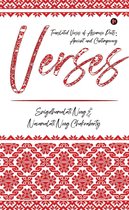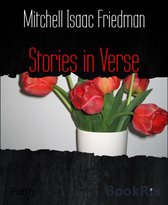Verses Ebook Tooltip Ebooks kunnen worden gelezen op uw computer en op daarvoor geschikte e-readers.
Afbeeldingen
Sla de afbeeldingen overArtikel vergelijken
- Engels
- E-book
- 9781465633613
- 15 september 2019
- Adobe ePub
Samenvatting
Far from the poets being astray in prose-writing (said Francis Thompson) it might plausibly be contended that English prose, as an art, is but a secondary stream of the Pierian fount, and owes its very origin to the poets. The first writer one remembers with whom prose became an art was Sir Philip Sidney. And Sidney was a poet. This quotation is relevant to a consideration of Hilaire Belloc, because Belloc is a poet who happens to be known chiefly for his prose. His Danton and Robespierre have been read by every intelligent student of French history, his Path to Rome, that most high-spirited and engaging of travel books, has passed through many editions, his political writings are known to all lovers—and many foes—of democracy, his whimsically imaginative novels have their large and appreciative audience, and his exquisite brief essays are contemporary classics. And since the unforgetable month of August of the unforgetable year 1914, Hilaire Belloc has added to the number of his friends many thousands who care little for belles lettres and less for the French Revolution—he has become certainly the most popular, and by general opinion the shrewdest and best informed, of all chroniclers and critics of the Great War. There is nothing, it may be said, about these achievements to indicate the poet. How can this most public of publicists woo the shy and exacting Muse? His superabundant energy may now and again overflow in little lyrical rivulets, but how can he find time to turn it into the deep channels of song? Well, what is the difference between a poet who writes prose and a prose-writer who writes verse? The difference is easy to see but hard to describe. Mr. Thomas Hardy is a prose writer. He has forsaken the novel, of which he was so distinguished a master, to make cynical little sonnet portraits and to pour the acid wine of his philosophy—a sort of perverted Presbyterianism—into the graceful amphora of poetic drama. But he is not a poet. Thackeray was a prose-writer, in spite of his delicious light verse. Every novelist writes or has written verse, but not all of them are poets. Of course, Sir Walter Scott was first of all a poet—the greatest poet who ever wrote a novel. And no one who has read Love in the Valley can hesitate to give Meredith his proper title. Was Macaulay a poet? I think so—but perhaps I am in a hopeless minority in my belief that the author ofThe Battle of Naseby and The Lays of Ancient Rome was the last of the great English ballad makers. But this general truth cannot, I think, honestly be denied; there have been many great poets who have devoted most of their lives to writing prose. Some of them have died without discovering their neglected talent. I think that Walter Pater was one of these; much that is annoyingly subtle or annoyingly elaborate in his essays needs only rhyme and rhythm—the lovely accidents of poetry—to become graceful and appropriate. His famous description of the Mona Lisa is worthless if considered as a piece of serious æsthetic criticism. But it would make an admirable sonnet. And it is significant that Walter Pater’s two greatest pupils—Lionel Johnson and Father Gerard Hopkins, S.J.,—found expression for their genius not in prose, the chosen medium of their “unforgetably most gracious friend,” but in verse. From Walter Pater, that exquisite of letters, to the robust Hilaire Belloc may seem a long journey. But there is, I insist, this similarity between these contrasting writers, both are poets, and both are known to fame by their prose. For proof that Walter Pater was a poet, it is necessary only to read his Renaissance Studies or his interpretations—unsound but fascinating—of the soul of ancient Greece. Often his essays, too delicately accurate in phrasing or too heavily laden with golden rhetoric, seem almost to cry aloud for the relief of rhyme and rhythm.
Productspecificaties
Inhoud
- Taal
- en
- Bindwijze
- E-book
- Oorspronkelijke releasedatum
- 15 september 2019
- Ebook Formaat
- Adobe ePub
- Illustraties
- Nee
Betrokkenen
- Hoofdauteur
- Hilaire Belloc
- Tweede Auteur
- Joyce Kilmer
- Hoofduitgeverij
- Library Of Alexandria
Lees mogelijkheden
- Lees dit ebook op
- Android (smartphone en tablet) | Kobo e-reader | Desktop (Mac en Windows) | iOS (smartphone en tablet) | Windows (smartphone en tablet)
Overige kenmerken
- Studieboek
- Nee
EAN
- EAN
- 9781465633613
Je vindt dit artikel in
- Categorieën
- Taal
- Engels
- Boek, ebook of luisterboek?
- Ebook
- Beschikbaar in Kobo Plus
- Beschikbaar in Kobo Plus
- Beschikbaarheid
- Leverbaar
Kies gewenste uitvoering
Prijsinformatie en bestellen
De prijs van dit product is 4 euro en 99 cent.- E-book is direct beschikbaar na aankoop
- E-books lezen is voordelig
- Dag en nacht klantenservice
- Veilig betalen
Rapporteer dit artikel
Je wilt melding doen van illegale inhoud over dit artikel:
- Ik wil melding doen als klant
- Ik wil melding doen als autoriteit of trusted flagger
- Ik wil melding doen als partner
- Ik wil melding doen als merkhouder
Geen klant, autoriteit, trusted flagger, merkhouder of partner? Gebruik dan onderstaande link om melding te doen.








